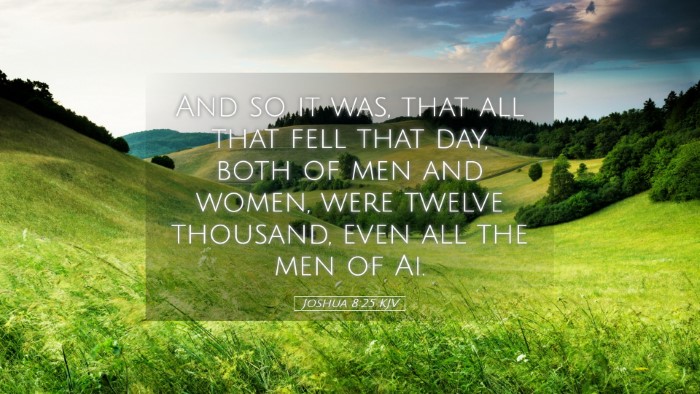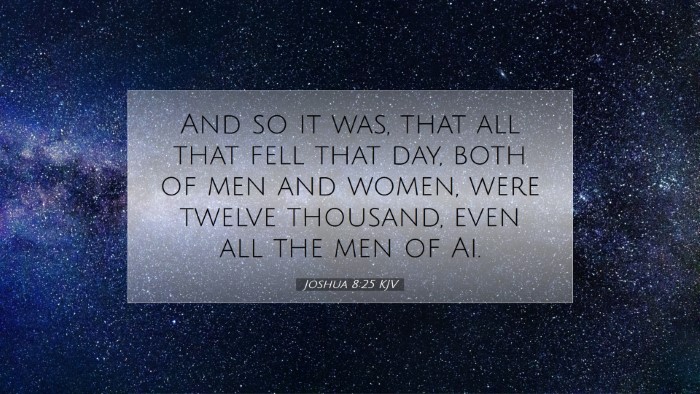Commentary on Joshua 8:25
Verse Context: This verse states, "And so it was that all who fell that day, both men and women, were twelve thousand—all the people of Ai." The account in Joshua 8 describes the Israelites' successful second attempt to conquer the city of Ai following their initial defeat in chapter 7. This verse captures the totality of the destruction wrought upon Ai.
Exegesis and Insights
Historical Context: The destruction of Ai is set against the backdrop of Israel's covenantal relationship with God. Their victory was not only a demonstration of military might but also an affirmation of divine support after the prior sin of Achan, which had led to their defeat.
Matthew Henry's Commentary: Henry emphasizes the significance of obedience and repentance leading to victory. He notes that the Israelites' careful adherence to God's commands directed them in the strategic ambush against Ai. Their success serves as a reminder that the Lord's anger can be turned away by returning to proper conduct.
Albert Barnes' Notes: Barnes reflects on the completeness of the victory, interpreting the number of casualties as a symbol of God's judgment. He points out that twelve thousand represents not merely a military statistic but a theological statement: God's justice is enacted against those who oppose His will. Barnes also highlights the importance of the distinction between the inhabitants of Canaan, whom the Israelites were commanded to destroy, and other groups in the Promised Land.
Adam Clarke's Commentary: Clarke offers additional historical and geographical context in understanding Ai. He suggests that this narrative serves to highlight Israel's transition from a state of failure to one of triumph, stressing that divine intervention was crucial for their success. Clarke notes the significance of this victory, marking it as a pivotal moment in Israel's conquest, symbolizing the turning of tides in their possession of the land.
Theological Implications
The assault on Ai raises profound theological questions regarding divine judgment and mercy, the implications of disobedience, and the requirements for righteousness in community life. The entire episode illustrates the abiding principle that God's favor is contingent upon adherence to His commands.
- The Nature of Divine Justice: The annihilation of Ai serves as a severe warning to the nations regarding the consequences of infidelity toward God.
- Mercy and Retribution: While God’s initial response to Israel’s sin resulted in defeat, His readiness to forgive and restore is evident in their ultimate victory.
- Collective Accountability: The community's fate is tied to individual actions, an ongoing theme within the biblical narrative.
Application for Modern Readers
For pastors, students, and theologians, the biblical account encourages reflections on leadership, communal responsibility, and reliance on divine guidance in the face of adversity.
Points for Reflection:
- Tithing and Holiness: Understanding the necessity of holiness in the community to experience God's presence and favor.
- War Ethics: Contemplating the morality of warfare in ancient times and discerning how these lessons apply within a modern context governed by ethical principles.
- Divine Sovereignty: Recognizing God's sovereign role in directing the affairs of nations and individual destinies.
This verse and the narrative surrounding it challenge the reader to consider both the justice of God and the righteous conduct required within the community of faith. It serves as a vital reminder of the consequences of sin while simultaneously offering hope through repentance and obedience.
Conclusion
Joshua 8:25 captures a pivotal moment in Israel’s journey, reflecting divine justice and mercy intertwined. The commentaries of Henry, Barnes, and Clarke elucidate substantial theological insights while providing applicable lessons for contemporary believers. As we meditate on this passage, let us strive for communal righteousness and foster an understanding of God's unwavering commitment to His people.


